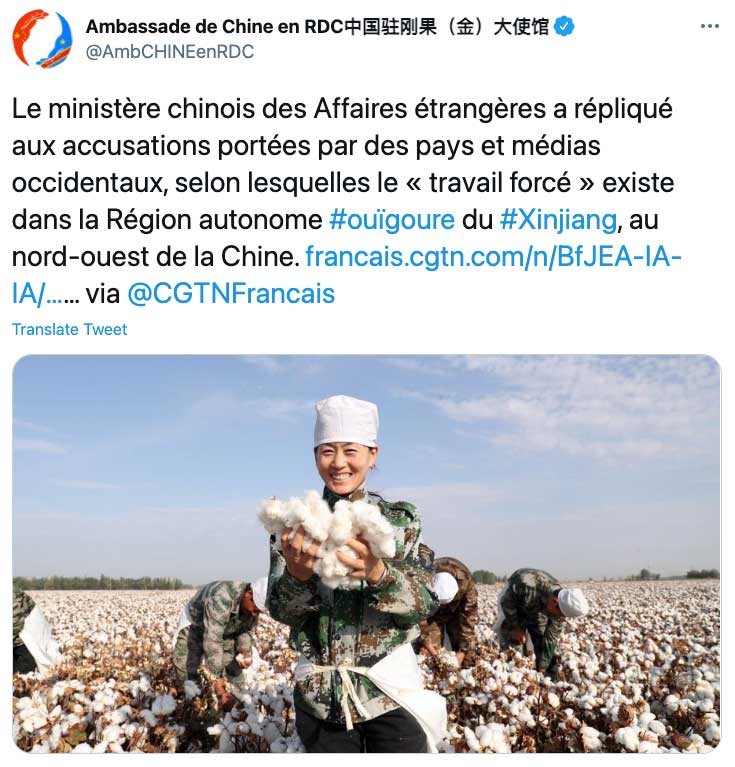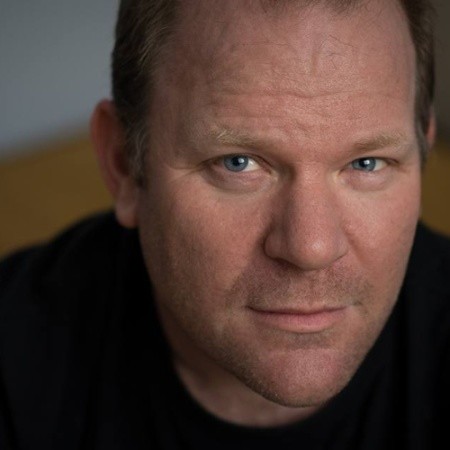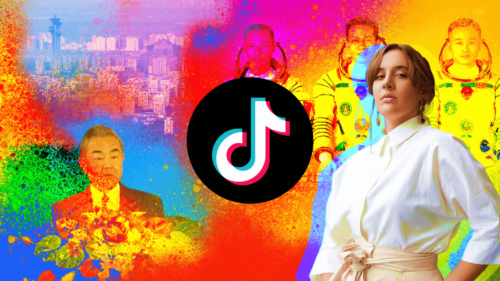Why are Chinese officials in Africa so active in messaging on Xinjiang?
A new wave of Chinese propaganda, pushing back on claims of genocide and human rights abuses in Xinjiang, is being promoted widely in Africa. Here are a few reasons why Africa might be a focus of this messaging campaign.

China’s propaganda strategists have launched a full-scale campaign in print, broadcast and social media to rebut allegations of genocide and widespread human rights violations in Xinjiang. The effort is especially noticeable in Africa where over the past 24 hours, Chinese diplomatic Twitter accounts are now filled with anti-Western statements and re-posts of content produced by state media outlets like People’s Daily and CGTN.
The key message that Chinese officials are trying to convey is that the well-documented accusations that up to a million Uyghurs have been forcibly interned are spurious and put forth by Western media, governments, and human rights organizations that are all hostile to China.
Instead, ambassadors like Zhào Yànbó 赵彦博 in Botswana promote a different story about Xinjiang that they clearly hope will resonate with stakeholders in developing countries. “China’s Xinjiang has never been more prosperous than it is now, with unprecedented achievements in socio-economic development and improvement of people’s life,” he tweeted on Tuesday. “I’m happy to see that the residents in Xinjiang could live a happy life in such a stable environment.”
Chinese missions and diplomats in Chad, South Africa, the DRC, Rwanda, Liberia, and Lesotho among many others all posted similarly upbeat narratives and statements on Tuesday about the purportedly great quality of life for Uyghurs in Xinjiang.
Also on Tuesday, China’s envoy to Pretoria, Chén Xiǎodōng 陈晓东, published a column on the partially-Chinese-owned South African news site IOL that singled out current and former U.S. government officials for having “openly interfered in China’s internal affairs, launched groundless accusations and attacks on China’s policies in Xinjiang, spread numerous disinformation and misinformation.”
Chen added that “the so-called ‘genocide’ tag against China” is the “lie of the century.”
Why Africa could be the new front in China’s battle over the Xinjiang narrative
ANTI-COLONIALISM: The Chinese government clearly sees itself as coming under assault from U.S. and European governments on this issue and is drawing on a deep reserve of domestic resentment rooted in earlier foreign interventions in their country (frequently referred to as “the century of humiliation“). Clearly, Chinese officials see an opportunity to rouse those same resentments of Western colonialism still present right below the surface in many African countries. At this point, there’s no evidence to suggest this approach, if in fact, that’s what they’re trying to do, is gaining any traction in Africa.
HUMAN RIGHTS: The tweets and propaganda stories about life in Xinjiang place disproportionate emphasis on the supposed economic advancements that Uyghurs have made in Xinjiang. This aims to reinforce a Chinese human rights worldview that places social and economic development ahead of civil and political rights. This human rights worldview finds great resonance in a growing number of African countries, where democracy and human rights have suffered considerable setbacks in recent years (examples include Uganda, Zambia, and Egypt.)
THE INTENDED AUDIENCE: While it may appear that China is hoping to influence African publics with this wave of propaganda, the desired audience for this messaging may actually be much smaller. China’s official media outlets and Twitter accounts are not widely consumed in Africa, so the audience reach is tiny. But the messaging may instead be targeted at African governments, who do follow those diplomatic Twitter accounts. The aim could be to convey to their hosts just how important the Xinjiang issue is to Beijing. So, when the time comes for one of those joint letters to be signed at the UN, or when China needs support in its escalating feud with the U.S. and Europe, they’ll know it’s a serious request.
Related stories on the China Africa Project:






